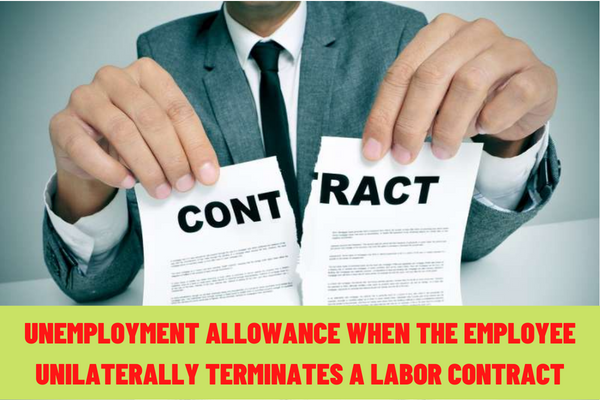Is an employee who unilaterally terminates a labor contract eligible for unemployment allowance according to current regulations of Vietnam? When is considered a legal unilateral termination of a labor contract?
What is unemployment allowance?
Pursuant to Clause 4 Article 3 of the Law on Employment 2013 of Vietnam, unemployment insurance means a scheme aiming to compensate part of income of a worker when he/she becomes unemployed, support him/her to receive vocational training, maintain employment, or seek employment, on the basis of making contributions to the Unemployment Insurance Fund.
And Article 42 of the Law on Employment 2013 of Vietnam stipulates unemployment insurance benefits, including:
- Unemployment allowance.
- Job counseling and recommendation support.
- Vocational training support.
- Support for training and retraining to improve qualifications of occupational skills for job maintenance for workers.
Thus, unemployment allowance is one of the unemployment insurance benefits, which is considered a support for employees when they become unemployed.

Is an employee who unilaterally terminates a labor contract eligible for unemployment allowance according to current regulations?
Is an employee who unilaterally terminates a labor contract eligible for unemployment allowance?
Pursuant to Article 49 of the Law on Employment 2013 of Vietnam on conditions for unemployment allowance receipt:
A worker defined in Clause 1, Article 43 of this Law who currently pays unemployment insurance premiums may receive unemployment allowance when fully meeting the following conditions:
- Terminating the labor contract or working contract, except the following cases:
+ He/she unilaterally terminates the labor contract or working contract in contravention of law;
+ He/she receives monthly pension or working capacity loss allowance.
- Having paid unemployment insurance premiums for at least full 12 months within 24 months before terminating the labor contract or working contract, for the case specified at Points a and b, Clause 1, Article 43 of this Law; or having paid unemployment insurance premiums for at least full 12 months within 36 months before terminating the labor contract, for the case specified at Point c, Clause 1, Article 43 of this Law.
- Having submitted a dossier for receipt of unemployment allowance to an employment service center under Clause 1, Article 46 of this Law.
- Having not yet found any job after 15 days from the date of submission of the dossier for receipt of unemployment allowance, except the following cases:
+ He/she performs the military or public security obligation;
+ He/she attends a training course of full 12 months or longer;
+ He/she serves a decision on application of the measure to send him/her to a reformatory, compulsory education institution or compulsory detoxification establishment;
+ He/she is kept in temporary detention or serves a prison sentence;
+ He/she goes abroad for settlement or as guest worker;
+ He/she dies.
Thus, only when the employee unilaterally terminates the labor contract in contravention of law, he/she is not eligible for unemployment allowance. If the remaining conditions are met, they will receive unemployment allowance.
When is considered a legal unilateral termination of a labor contract?
According to the current law of Vietnam, an employee is free to unilaterally terminate a contract for any reasons. However, in order to limit mistakes and difficulties for the employer, Clause 1 Article 35 of the Labor Code 2019 of Vietnam has regulations on the prior notice duration. Specifically:
+ at least 45 days in case of an indefinite-term employment contract;
+ at least 30 days in case of an employment contract with a fixed term of 12 - 36 months;
+ at least 03 working days in case of an employment contract with a fixed term of under 12 months;
+ The notice period in certain fields and jobs shall be specified by the government.
Thus, depending on the specific type of contract, the law sets forth different provisions on the duration. However, there are still cases where the employee can unilaterally terminate the labor contract without prior notice. Specifically, based on the provisions of Clause 2 Article 35 of the Labor Code 2019 of Vietnam, if he/she:
+ is not assigned to the work or workplace or not provided with the working conditions as agreed in the employment contract, except for the cases specified in Article 29 of this Labor Code;
+ is not paid adequately or on schedule, except for the case specified in Clause 4 Article 97 of this Code.
+ is maltreated, assaulted, physically or verbally insulted by the employer in a manner that affects the employee’s health, dignity or honor; is forced to work against his/her will;
+ is sexually harassed in the workplace;
+ is pregnant and has to stop working in accordance with Clause 1 Article 138 of this Labor Code.
+ reaches the retirement age specified in Article 169 of this Labor Code, unless otherwise agreed by the parties; or
+ finds that the employer fails to provide truthful information in accordance with Clause 1 Article 16 of this Labor Code in a manner that affects the performance of the employment contract.
Thus, according to the above provisions, if you ensure the provisions on the prior notice duration, your case of unilateral termination of the contract will be considered lawful. Thus, in this case, you will receive unemployment allowance if you meet the conditions in Article 49 of the current Law on Employment.
LawNet
